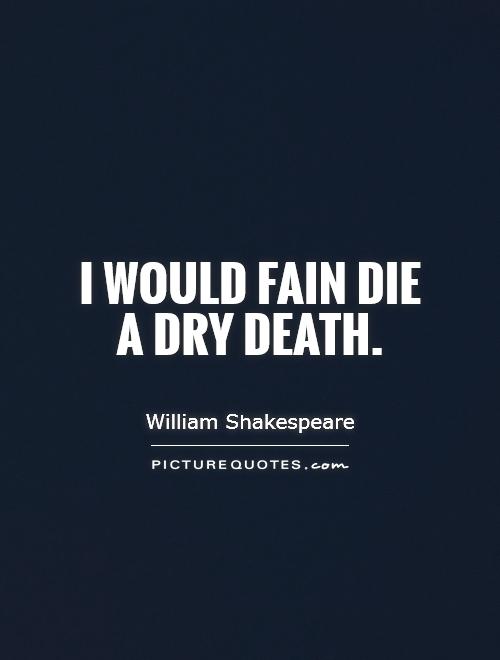I would fain die a dry death

I would fain die a dry death
The phrase "I would fain die a dry death" is spoken by Caliban in William Shakespeare's play "The Tempest". Caliban is a complex and intriguing character, often seen as a symbol of the oppressed and marginalized in society. In this particular line, Caliban expresses his desire for a death that is not drowned or suffocated, but rather a death that is dry and perhaps more dignified.Caliban's wish for a dry death can be interpreted in a number of ways. On one level, it may simply be a reflection of his fear of drowning or suffocating, which are often seen as particularly painful and undignified ways to die. Caliban's desire for a dry death could also be seen as a reflection of his desire for a death that is free from the influence and control of others. Throughout the play, Caliban is constantly at the mercy of Prospero, the powerful magician who has enslaved him. By expressing his wish for a dry death, Caliban may be asserting his desire for autonomy and self-determination, even in death.
Additionally, Caliban's wish for a dry death could be seen as a reflection of his desire for a death that is free from the chaos and turmoil that surrounds him. Throughout "The Tempest", Caliban is constantly caught up in the machinations of the other characters, particularly Prospero and his daughter Miranda. By expressing his wish for a dry death, Caliban may be expressing his desire for peace and tranquility, even in death.
Overall, Caliban's statement "I would fain die a dry death" is a powerful and poignant expression of his desire for autonomy, dignity, and peace. It serves as a reminder of the struggles and desires of those who are oppressed and marginalized, and highlights the universal human desire for a death that is dignified and free from suffering.












 Friendship Quotes
Friendship Quotes Love Quotes
Love Quotes Life Quotes
Life Quotes Funny Quotes
Funny Quotes Motivational Quotes
Motivational Quotes Inspirational Quotes
Inspirational Quotes